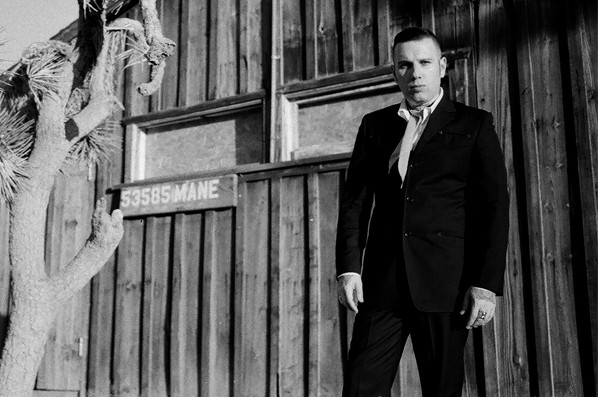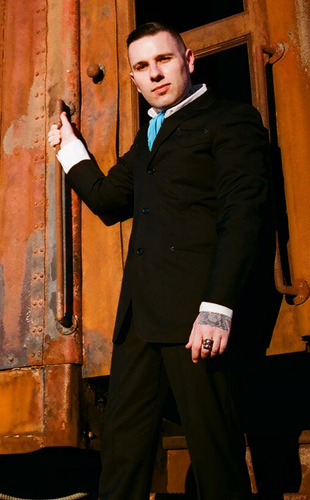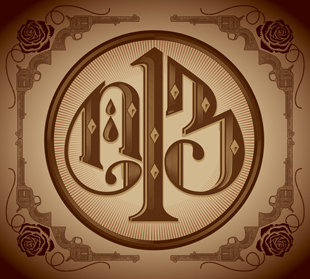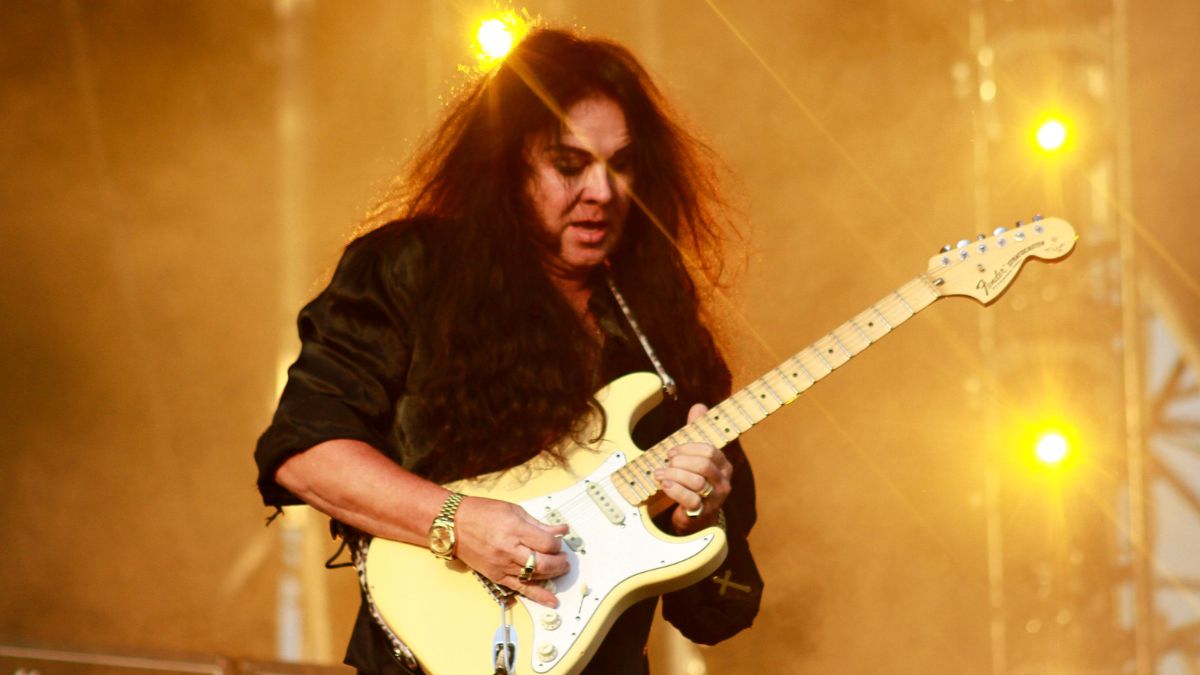Interview: Nick 13 of Tiger Army — Solo

Guitarist and singer Nick 13, longtime frontman of perennial California psychobilly mainstays Tiger Army, has been flirting with roots and classic country/western motifs for years.
On each successive Tiger Army album, tucked between songs ranging from melodic, punk-peppered mainstream rock to intense, no-holds-barred psychobilly, listeners could find carefully crafted nods to vintage Americana.
The occasional pedal steel runs, acoustic rhythm guitars and sparse, echo-laden lead lines were enough to imply that Nick 13 was drawing inspiration from several quintessentially American sources.
So it's no surprise that Nick 13's self-titled debut solo album, released June 7 via Sugar Hill Records, is a full-on, vintage-inspired country/western blowout featuring acoustic and electric guitars, standup bass, pedal steel and fiddle. The album's 10 tracks, which recall the sounds of classic honky-tonk and California country music, are full of heartbreak, life experience and passion.
Guitar World recently chatted with Nick 13 about the new album, his vintage gear and the future of Tiger Army.
GUITAR WORLD: Discuss your transition from psychobilly frontman with Tiger Army to solo country/western artist. What inspired you to make a pure country album?
I’ve loved country music from the 1930s to the '60s for a long time. Tiger Army has dabbled in country and roots to an extent, but I wanted to take it farther. I’d thought about making a record like this for years, and I was so inspired by a tour stop in Nashville that I decided I’d finally make time after Tiger Army had finished touring the record we had out at the time. It took even longer than I expected, but it finally came together.
Get The Pick Newsletter
All the latest guitar news, interviews, lessons, reviews, deals and more, direct to your inbox!

When and how were you initially influenced by country music, and who were your influences? I sense a bit of Hank Williams, Carl Perkins and Ray Price. Any hillbilly and honky-tonk influences?
Those are three of the big ones right there. I came to hillbilly music through rockabilly music as a teenager. I picked up those Carl Perkins records for the stomping rockabilly numbers, but hearing songs like “Sure To Fall” and “Let the Jukebox Keep On Playing” gave me my first dose of hardcore honky-tonk, and I was hooked.
I went to Hank from there and kept right on going. The incredible melodies of The Louvin Brothers made a big impression on me; Bill Monroe as well. Ray Price, Webb Pierce, Lefty Frizzell, George Jones and, of course, all the California guys: Merle [Haggard], Buck [Owens], Wynn Stewart.
With at least one country-leaning song on each Tiger Army album, would you say you’ve been building toward this?
I’d say so. At one point, we were doing a mini-set of those songs during our shows. It was such a different energy than our other live stuff, but I craved more.
Discuss the differences between writing songs and playing guitar with Tiger Army and as a solo performer.
The original reason I wanted to use a lead player for the first time was to focus more on my vocals. Ricky Nelson had James Burton, and so on. Ironically, I’ve probably learned more about guitar on this record than any other. It’s definitely pushed me forward as a rhythm player, different chord voicings that are more common to hillbilly than rock, the list goes on. And you can’t play with as many great guitar players as I have on this thing and not learn something.
As far as writing, it was a little more fluid with the solo record. There were certain signature riffs and melodic elements that needed to remain, but some of the arrangements evolved in different directions than I’d originally conceived, with some cool surprises. With Tiger Army, it’s more about actualizing a particular vision for a song with little deviation.
Discuss the process of recording the solo album. Did you use seasoned country musicians and producers? The steel guitar in particular is incredible, and the timbre and tone of the standup bass reminds me of a few songs from the last Tiger Army album (2007's Music from Regions Beyond). Is there any Tiger Army musician overlap on your solo album?
The only overlap as far as players is producer Greg Leisz; he’s played pedal steel on all four Tiger Army albums. He produced the album with James Intveld. They’re both known more as players than producers, but their incredible musicality and multi-instrumental ability made them a great team.
Josh Grange, who plays with Dwight Yoakam and k.d. lang, played on most of the record; Eddie Perez [Dwight Yoakam, Mavericks] does some amazing Bakersfield-style shredding on a couple of tracks.
Greg is probably better known as a steel player than a six-string guy, but he’s amazing at both. The legendary steel player Lloyd Green is on three cuts as well. He played on The Byrds’ Sweetheart of the Rodeo and the amazing "Little Darlin’"-era Johnny Paycheck stuff, among many other things, and he still sounds great!
Where did you record the album and how?
The album was mostly recorded in and around Los Angeles, but I did go to Nashville to get Lloyd Green and Eddie Perez on the record. The tracking and mixing studios all had vintage Neve consoles. The recording process was fairly drawn out due to constant session work and touring on the part of the producers and players, but the results were worth it.
I know you own several vintage guitars, including a 1955 Gretsch Rancher. What others do you own, and which is your favorite or most-prized guitar? Are you generally a Gretsch fan?
Definitely. Solo, I only play acoustic and leave the lead duties to someone else, whereas Tiger Army is a three-piece. I have a ’57 Gretsch Duo Jet and an early ‘60s Double Anniversary, both of which are used on the new album. Another favorite is a refinished ’56 Fender Esquire. I have other Grestch Anniversary models and a ‘60s Rickenbacker 330, among other things. Someday I’d like to add the right '50s Les Paul Junior and early '60s Mosrite.

Which guitars did you use on the album?
Acoustic-wise, the ’55 Rancher is definitely on quite a few cuts. The other main acoustics used were a 1940s Martin D-18 and a '50s Gibson J-45 that belongs to Greg. And while I didn’t play electric, several of my electrics were used, including the Gretsch Duo Jet and Anniversary I mentioned before, as well as the Fender Esquire.
Josh Grange used his ’64 Gibson ES-335 on “Someday” and a few other cuts. We borrowed a ’52 Tele from my friend Jonny "2 Bags" Wickersham of Social Distortion. Greg had a '50s Gretsch Fire Jet that he used for some overdubs, his own '50s Tele and a vintage Jazzmaster that he played on “Carry My Body Down” next to the Gretsch track that Josh had played.
How about amps and effects?
Between Greg, myself and some of the players, we had an arsenal of vintage Fender amps. Some of the main ones were a '50s tweed Harvard, my ’64 blackface Deluxe, Greg’s blackface Princeton and a silverface Deluxe. A vintage reverb tank (also courtesy of Mr. "2 Bags") was used on some of the tweeds. Most of the effects came directly from the amps, reverb, vibrato and so on. A '60s Gibson Falcon was also used here and there.
What’s your typical setup with Tiger Army?
Live, I generally play a ’57 reissue Grestch Duo Jet run through one or two Fender Tone Masters. I’ve been using a lacquer-finish White Falcon for some songs in recent years. I use a Boss DM-2 analog delay and occasionally a chorus pedal if the song calls for it -- usually an Ibanez CS-9 or a Boss CE-2.
What’s your summer touring schedule like? Do the Nick 13 shows coincide with Tiger Army shows?
I’m mostly focused on touring and promoting the solo album this year, but it is the 15th anniversary of Tiger Army so we had to do a couple of shows; we play the Orange County Fair on July 30 and Tempe, Arizona, the next night. That may be it for the year. Solo, I’ll be on tour in the States for much of the summer and well into the fall. My solo Facebook page is a good place to view the dates.Is there a new Tiger Army album in the works?Not officially, but I never know when a melody will pop into my head, then I’m grabbing the nearest guitar and recording device, my phone or whatever. I’ve definitely got several TA songs written that I’m excited about; that’s also true for solo. I can’t say which one I’ll head into the studio with first at this point, but I can say that the future will bring another solo album and another Tiger Army album.

Damian is Editor-in-Chief of Guitar World magazine. In past lives, he was GW’s managing editor and online managing editor. He's written liner notes for major-label releases, including Stevie Ray Vaughan's 'The Complete Epic Recordings Collection' (Sony Legacy) and has interviewed everyone from Yngwie Malmsteen to Kevin Bacon (with a few memorable Eric Clapton chats thrown into the mix). Damian, a former member of Brooklyn's The Gas House Gorillas, was the sole guitarist in Mister Neutron, a trio that toured the U.S. and released three albums. He now plays in two NYC-area bands.
“I loved working with David Gilmour… but that was an uneasy collaboration”: Pete Townshend admits he’s not a natural collaborator – even with bandmates and fellow guitar heroes
“This guy kept calling saying, ‘I’ve never been in a band before, but I’m the best guitarist ever.’ When I heard him play it was like a fire from heaven”: The life and times of Killing Joke visionary Geordie Walker – the guitar hero’s guitar hero







![[from left] George Harrison with his Gretsch Country Gentleman, Norman Harris of Norman's Rare Guitars holds a gold-top Les Paul, John Fogerty with his legendary 1969 Rickenbacker](https://cdn.mos.cms.futurecdn.net/TuH3nuhn9etqjdn5sy4ntW.jpg)


